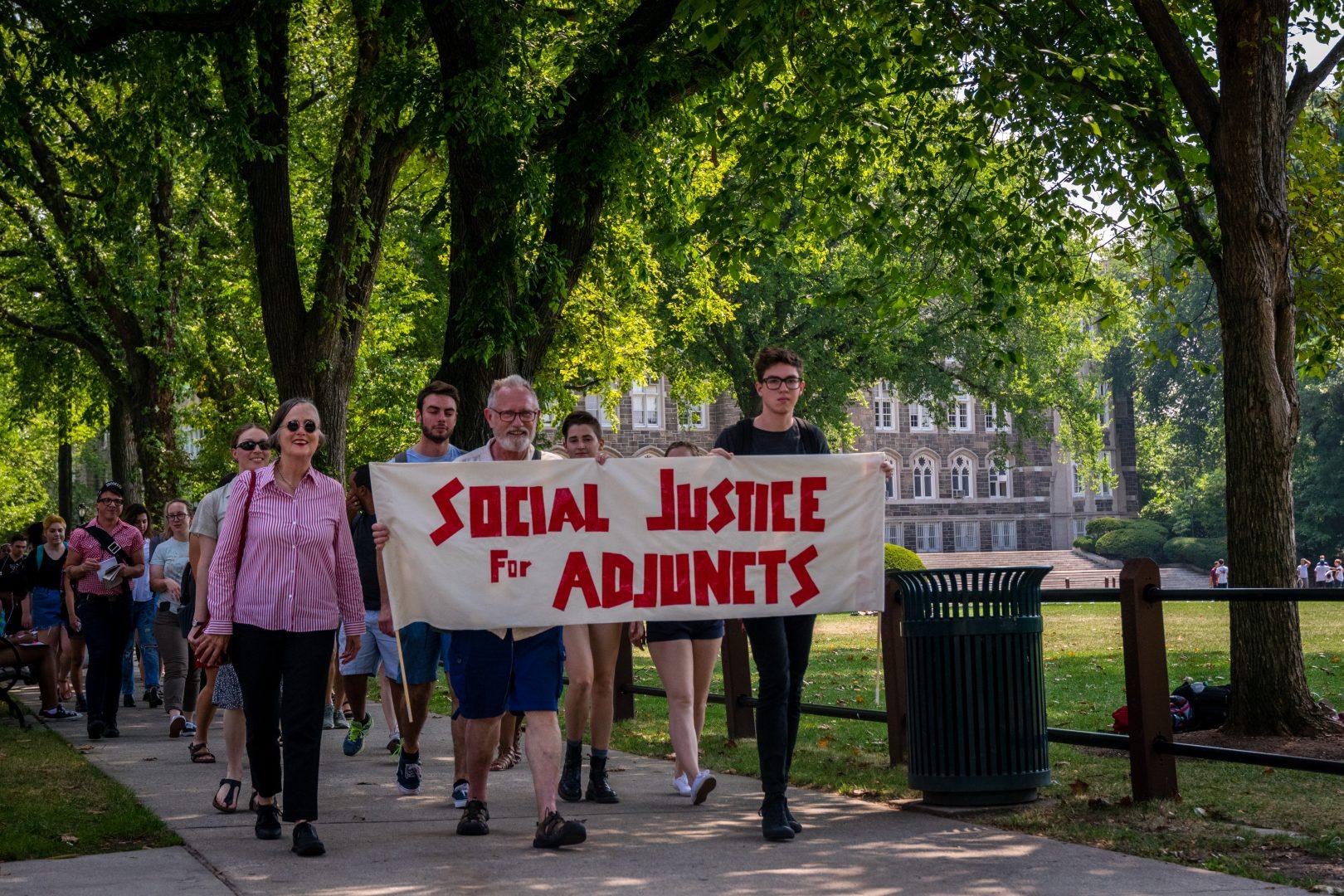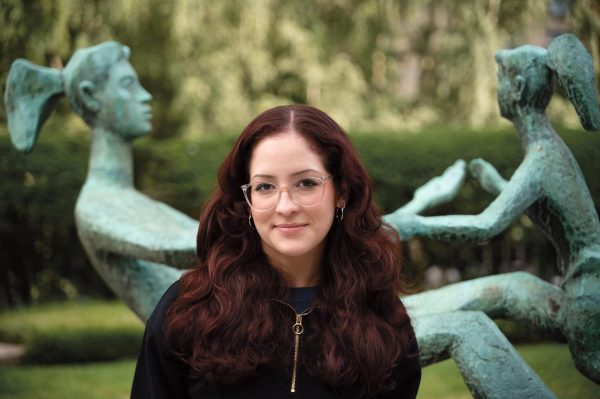Faculty Union in Negotiations To Renew Contract
The union proposed wage raises, improved health benefits and pay equity in its collective bargaining agreement
COURTESY OF ASHAR FOLEY
The union’s bargaining committee met to discuss further negotiations for adjunct and nontenure track professors.
September 29, 2022
Since March, Fordham Faculty United (FFU) has been negotiating its next collective bargaining agreement with Fordham to improve working conditions and benefits for adjunct and full-time nontenure-track professors. The union ratified its first contract in 2018 and began deliberations for its new contract this year after the three-yearlong contract was extended in 2021 due to COVID-19.
FFU has outlined three priorities: increased pay, better health benefits for adjunct faculty and pay parity among professors in different schools within the university. The demands were first announced on Aug. 16 in an open letter addressed to the Fordham community.
According to FFU’s promotional flyers, the typical maximum adjunct faculty annual salary at Fordham is $28,800. Joshua Jordan, chair of FFU and a senior lecturer in French at Fordham, said that the pay is insufficient, especially given the rising costs of living in New York City. The current living wage salary in NYC, as calculated by the MIT Living Wage Calculation for Bronx County, is $52,000.
According to Jordan, the majority of faculty at Fordham are contingent, not tenured or tenure-track, and among FFU’s estimated 650 members, about 530 of them are adjunct.
In order to address these issues, FFU is proposing a $500 to $1,000 increase in pay per course each year. This change would amount to a total increase of at least $1,500 in three years for adjunct professors.
The largest increases for adjuncts would be directed toward narrowing the gap in the Graduate School of Arts and Sciences, the Graduate School of Social Service, and the Graduate School of Religion and Religious Education (GSRRE), where adjuncts are paid significantly less than their tenured peers.
For an adjunct faculty with three or fewer years of experience in the College of Arts and Sciences (CAS), the union’s proposal would increase pay per course from $7,000 to $8,500 by 2024. The administration’s proposal will increase it to $7,649.09 by 2024. Prior to unionizing, adjuncts made as little as $3,900 per course working in CAS.
As of the most recent negotiation session on Sept. 22, the Fordham administration wants to increase pay per course for undergraduate adjunct professors in the next contract by 3% each year. For professors in CAS with three or fewer years of experience, that raise would amount to approximately $216 in pay per course each year.
FFU also proposed pay parity among the schools at Fordham University as one of its priorities. Currently, adjunct faculty with three or fewer years of experience at GSRRE are earning $4,600 per course, thousands less than adjunct faculty with the same experience in CAS. The university is proposing a 3% increase for them as well and, through negotiations, has been willing to raise the base salary up to $5,500, according to Jordan and Ashar Foley, FFU’s chief steward and an advanced lecturer in communications and media.
Bob Howe, associate vice president for communications, shared that the university’s 3% wage increase is in line with the wage increases that the university has settled on with other employee groups during the same period.
FFU believes that working conditions provided by the university should reflect its motto and values.
“The proposed increase follows the approximately 40% increase Fordham provided to most members in the first collective bargaining agreement entered into in 2018,” Howe said. “Because the adjuncts in the Graduate School of Social Service and Graduate School of Religion did not fully realize the large increases gained in the 2018 contract, we have proposed a significant jump in their base salary which far exceeds 3%.”
He added that the university has offered adjunct faculty a payment of up to $800 to assist with the cost of health benefits because many receive subsidized health benefits on the New York State Exchange and noted that the university’s proposal will provide most adjuncts with an increase of over $1,800 in the first year of the contract.
FFU believes that working conditions provided by the university should reflect its motto and values.
“It’s a real gesture but it comes up well short of what most of us think of when we think: cura personalis,” Jordan said.
Foley said that for weeks the administration has not been willing to increase their current 3% proposed raise.
According to Jordan, the university is providing up to $1,760 for adjunct faculty in total, and most do not qualify for the full amount. Faculty who taught courses during the previous academic year and have been offered courses at Fordham this academic year could potentially be offered $240 per course that they instruct this year as a one-time “bonus” under this proposition. This bonus, in addition to the $800 health credit, contributes to the $1,760 total. Jordan noted that the addition of the health credit does not mean that adjuncts are offered a better health plan.
Foley said that for weeks the administration has not been willing to increase their current 3% proposed raise. According to Foley, Fordham instructors hadn’t seen any blanket raises for 10 years before the union was recognized in 2018 and ratified its first contract, which meant that prior to that, professors had to negotiate individual raises.
Before becoming a full-time faculty member in 2017, Foley worked part time as an adjunct professor at Fordham and the New York City College of Technology in the City University of New York (CUNY) system. She described her experience as an adjunct faculty member as “cobbling money together.”
“You are constantly worrying about whether or not your classes get full enrollment, whether you get offered classes, and whether or not anybody complains or there’s any other problem that’s going to take classes away from you,” Foley described. “Because then you have to figure out how to fill that three- to five-thousand-dollar gap or more, depending on where you’re working, and it’s just a constant churn.”
Adjunct professors are limited to teaching two courses per semester, meaning that many depend on employment at other colleges and universities to work a living wage. Without knowing whether they will be assigned to teach a course the following semester, adjuncts are employed with limited job security.
And yet, when Foley was offered a full-time, nontenure-track position at Fordham in 2017, prior to the unionization of nontenure-track faculty, it wasn’t a simple decision.
“It will mean more stability, it will mean more money, but I will not be having a union job anymore,” she said. “So, I could switch over, lose my benefits, lose my seniority, lose my place at CUNY, in order to work for Fordham, a non-union workplace, where they could use me for a semester and fire me if they wanted to, and then I would be royally screwed.”
In addition to pay raises, FFU is asking for more comprehensive health benefits for adjunct faculty.
Jordan noted that the total cost of the union’s proposed pay raises for all faculty does not exceed $2 million per year. He compared it to the operational costs of the newly built Joseph M. McShane, S.J. Campus Center, which totals $9.3 million annually.
In addition to pay raises, FFU is asking for more comprehensive health benefits for adjunct faculty. Adjuncts are offered limited medical coverage by the university, and the union proposed that adjuncts have access to the same health benefits tenured faculty receive. According to Jordan, enrollment records provided to FFU by the university show that only one adjunct faculty member is enrolled in the health benefits currently available to adjuncts.
“This has been a goal of ours, and we’ve achieved only part in 2018, and that’s to lift up the most precarious and most vulnerable amongst our members,” Jordan said. “Part of that, especially coming off of COVID-19, is health.”
The union and administration are continuing negotiations on an extension that will end this month. Faculty and students have been wearing purple in solidarity with the union efforts.
















